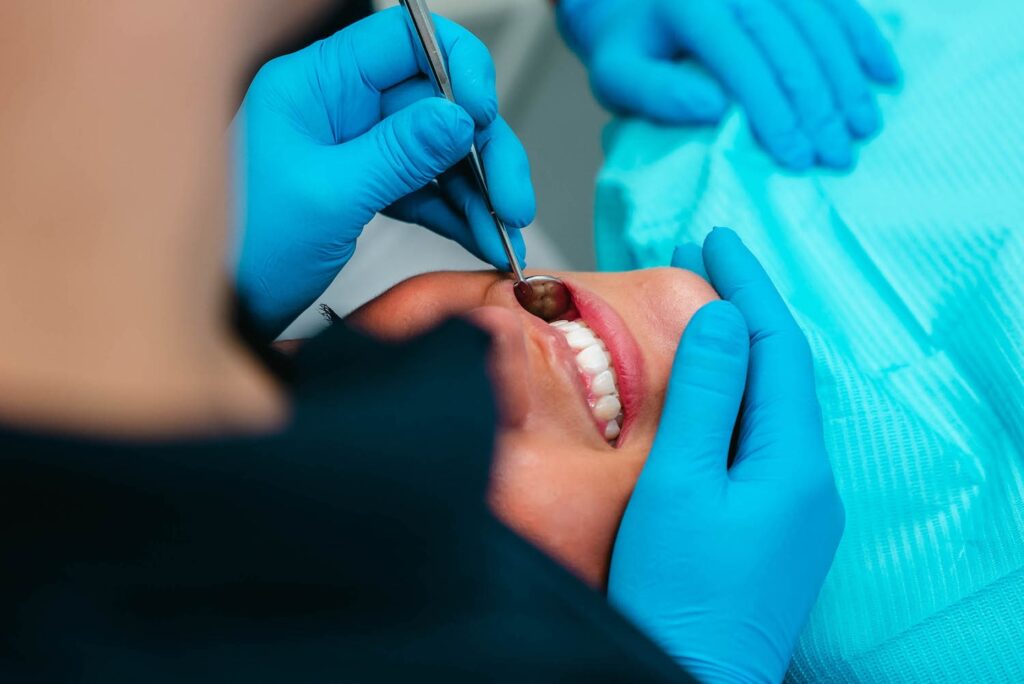
These changes mean that some pregnant women experience gingivitis - even if they didn't have it before pregnancy. In professional terms, this is called pregnancy gingivitis.
Gingivitis causes bleeding (especially when brushing) and swollen gums, which can be tender. The condition is harmless and typically goes away after pregnancy, but can be bothersome and requires extra care with oral hygiene.
Pregnancy and the dentist - What about oral hygiene?
If you're pregnant, it's especially important to maintain good oral hygiene to prevent inflammation, which pregnant women are particularly prone to due to hormonal changes. Good oral hygiene is maintained by brushing effectively morning and night and flossing between all teeth.
If you have a lot of tartar build-up, it may be a good idea to have a professional dental cleaning at the beginning of your pregnancy. This makes it easier to keep your teeth clean, as the cleaning makes your teeth smooth, making it harder for bacteria to attach to the tooth and easier to remove with regular brushing. Even if you don't form tartar, professional cleanings are a great way to help maintain oral hygiene during pregnancy.
Pregnancy and gingivitis
During pregnancy, the hormonal balance changes, resulting in altered gum reactions to the bacteria present in the plaque. The composition of the bacteria also changes. These changes mean that some pregnant women experience gingivitis even though they didn't have it before pregnancy. In professional terms, this is called pregnancy gingivitis.
Gingivitis causes bleeding (especially when brushing) and swollen gums, which can be tender. The condition is harmless and typically goes away after pregnancy, but can be bothersome and requires extra care with oral hygiene.
Pregnancy and dental treatments
Always seek dental care if you need it, even when you are pregnant, but always inform the dentist about your pregnancy. The reason why certain treatments are avoided is the risk of fetal damage. However, this risk is very small and many dental treatments can be performed safely even when you are pregnant, such as regular teeth cleaning and brushing.
However, dental procedures that require anesthesia are avoided as much as possible, especially in the first and last trimester, or certain local anesthetics are avoided. Many treatments can wait until after pregnancy. Talk to your dentist for advice and guidance in your specific situation.
Pregnancy and tooth decay
In the old days, it was said that you lost a tooth for every child you had. This is an old superstition. You don't get cavities more easily or more often when you're pregnant than otherwise. If you get cavities during pregnancy, it's often due to a change in eating habits, especially if you consume more sugar than usual and more frequently.
Avoiding cavities during pregnancy is, as always, a matter of maintaining good oral hygiene. If you suffer from severe morning sickness that makes it difficult to brush your teeth in the morning, rinse your mouth thoroughly and wait until the nausea has subsided before brushing.
"Remember to tell us that you are pregnant, so we can advise you and plan your treatments in the best possible way. This also applies to early pregnancy."
Read more about what the Danish Dental Association has to say on the subject.
FAQ - Pregnancy and dental visits
Yes, pregnant women can and should visit the dentist. Visiting the dentist is an important part of general healthcare, and it's especially important for pregnant women to maintain good oral hygiene and receive treatment for dental problems. Some dental treatments, such as x-rays, may be limited during pregnancy, but alternatives are available.
Yes, you can have tooth decay during pregnancy, but it's important to inform your dentist about the pregnancy. The dentist will take the necessary precautions to ensure the safety of both you and your unborn child. In general, it is recommended to perform dental procedures in the second trimester, as the first and third trimesters are more sensitive periods in pregnancy.
Yes, pregnant women can get anesthesia at the dentist. The dentist will typically choose to use a local anesthetic that is safe for both mother and baby during pregnancy. It's important to inform the dentist about your pregnancy so that they can take appropriate consideration and choose the most suitable type of anesthesia for your situation.
Contact us and get advice
If you have any doubts or questions, don't hesitate to contact us.

- I look forward to meeting you in the clinic.
- Dental hygienist
Barin Fatima Ekhlas was born in 1994 and graduated as a dental hygienist from the University of Copenhagen's School of Clinical Assistants and Dental Hygienists in 2017.
Contact Tandliv for questions
Do you have questions about prices or the course of treatment?
Contact Tandliv today and get answers to your questions.

